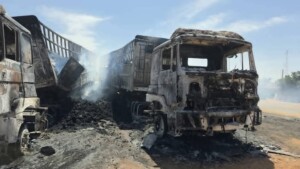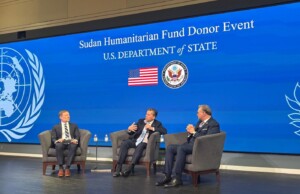Dutch Development Minister: ‘Education is especially important in Sudan’
The Dutch Minister of Foreign Trade and Development Cooperation, Sigrid Kaag, met with Sudanese Prime Minister Abdallah Hamdok, Minister of Cabinet Affairs Omer Manis, and the Minister of Foreign Affairs Asmaa Abdullah in Khartoum earlier today. Prime Minister Hamdok asked the Netherlands to help Sudan to get removed from the US list of states sponsors of terrorism.
 Minister Sigrid Kaag of Foreign Trade and Development Cooperation visits a school for Eritrean refugee children in Khartoum (Dutch embassy Khartoum)
Minister Sigrid Kaag of Foreign Trade and Development Cooperation visits a school for Eritrean refugee children in Khartoum (Dutch embassy Khartoum)
The Dutch Minister of Foreign Trade and Development Cooperation, Sigrid Kaag, met with Sudanese Prime Minister Abdallah Hamdok, Minister of Cabinet Affairs Omer Manis, and the Minister of Foreign Affairs Asmaa Abdullah in Khartoum earlier today. Prime Minister Hamdok asked the Netherlands to help Sudan to get removed from the US list of states sponsors of terrorism.
Minister Kaag emphasized that helping Sudan to achieve stability is very important for the whole region.
In a separate meeting Kaag also met with Sovereign Council President Abdelfattah El Burhan. They discussed transitional justice, human rights and justice for the victims of the ousted Al Bashir regime. Kaag confirmed that the Netherlands will continue to support Sudan and said she hoped a real democratic transformation takes place in Sudan. Kaag also met Sovereign Council member Aisha Mousa.

Sudanese Prime Minister Abdallah Hamdok (Dutch embassy Khartoum)
Minister Kaag started her visit to Khartoum by meeting entrepreneurs, united in Orange Corners Sudan, that take responsibility for the Sudanese society by employing young people.
She visited the murals at the site of the sit-in in front of the General Command, that violently dispersed on June 3 2019.
She bicycled through Khartoum with the Sudanese Cyclist Initiative Madaniya.
She visited a school in Khartoum for Eritrean refugee children, where also the girls can learn, among other things, how to be a car mechanic or electrician. Minister Kaag: “This will provide these young women with a financially independent future and will contribute to the Sudanese economy.”
Two weeks ago Sovereign Council member Siddig Tawir visited the Netherlands and spoke with the Dutch Minister of Foreign Affairs.
Prospects project
Kaag was also present today at the launch of the ‘Prospects’ project, that will support displaced groups and their host communities in Sudan. The project is funded by her ministry with € 40 million and will be carried out by UNICEF, UNCHR and four other international organisations.
The project will last four years and aims to help refugees and forcibly displaced people with sustainable solutions to support better integration and inclusion. Self-reliance and empowerment are at the heart of the Prospects-approach.
Speaking at the launch of the Prospects Sigrid Kaag said: “Sudan has a young population, so education is especially important. If you need to give them prospects with a capital P, you will need to invest in the private and public sector in creating new kinds of jobs to help Sudan.”
The project will work in East Darfur and West Kordofan, where not only some 150,000 South Sudanese refugees live, but also internally displaced people. They have traditionally received only limited support.
In one of the main Dutch newspapers minister Sigrid Kaag was interviewed about the Prospects project. In this article, aimed at a Dutch public, she emphasized that one of the main goals of the Prospects project is to offer young people in Africa economic perspectives "so they will not attempt to cross the Mediterrean Sea to Europe". There are an estimated 1.9 million internally displaced in Sudan and 1.1 million from South Sudan (800,000), Eritrea (121,000) and Syria (93,000). Youth unemployment in Sudan is huge. The economic situation for young refugees is even worse than that of young Sudanese. Minister Kaag acknowledges that the Prospects project can only make a small contribution towards the situation of young refugees in Sudan. "Development cooperation never is big money."
Radio Dabanga’s editorial independence means that we can continue to provide factual updates about political developments to Sudanese and international actors, educate people about how to avoid outbreaks of infectious diseases, and provide a window to the world for those in all corners of Sudan. Support Radio Dabanga for as little as €2.50, the equivalent of a cup of coffee.












 and then
and then